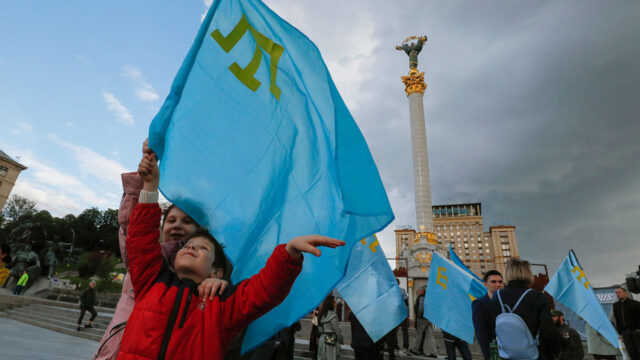
Crimea: Where Russia’s War Started and Where Ukraine Will Win
By:

Executive Summary
- Russian President Vladimir Putin’s annexation of the Crimea Peninsula in 2014 emboldened Moscow to launch the full-scale invasion of Ukraine, fanning the flames of “pan-Russian” nationalism and providing the ideological justification.
- The cultural, military, and geopolitical significance of Crimea is underpinned by its outsized importance in Putin’s understanding of his own role as the “gatherer and unifier of Russian lands.”
- Crimea offers a cautionary tale of what a decade of Russian occupation can bring as the peninsula has served as a testing ground for the Kremlin’s repressive Russification and de-Ukrainianizing policies Most egregious of these acts are the atrocities committed against the Crimean Tatars and other minority groups.
- Understanding how Crimea was stolen from Ukraine, both operationally and diplomatically, provides a framework to conceptualize how Moscow’s Anschluss and the 2022 invasion could have been avoided. The 2014 annexation was made possible due to the Kremlin’s infiltration and cooption of Ukraine’s political, security, and military institutions.
- The West’s inadequate response to the invasion of Georgia in 2008 and the subsequent invasion of Crimea and southeastern Ukraine led Putin to believe that the West was too “weak and divided” and could be easily “bought.”
- For Ukraine to defeat Putin’s army, it requires munitions on a scale and timetable that the West has thus far been either unable or unwilling to provide. The future of Ukraine may come down to the results of the 2024 US presidential elections, as European arms will not be sufficient for Kyiv to retake its stolen territory.
*Read the full report.
Introduction
The first invasion of a neighbor and forcible change of international borders in Europe since World War II took place in Crimea a decade ago when Russia invaded and annexed the peninsula.[1] Moscow’s current full-scale war against Ukraine has been an outgrowth of weak Western responses to Russia’s invasions of Georgia and Ukraine in 2008 and 2014, respectively.[2] The Kremlin blatantly violated international law in both invasions when it illegally annexed two regions of Georgia (South Ossetia and Abkhazia) and three regions of Ukraine (Crimea and approximately half of the two Donbas oblasts, Donetsk and Luhansk).
The Western response to both invasions was weak, with no sanctions imposed for the invasion and annexation of Georgian territory and only mild sanctions for the annexation of Crimea and invasion of Ukrainian territory. After 2008, much of the West continued business as usual with Russia. For example, former US President Barack Obama’s administration, believing former Russian President Dmitry Medvedev to be more flexible than his predecessor, launched a reset of US-Russian relations.[3] During the 2012 US presidential elections, Obama ridiculed his Republican Party rival Mitt Romney, who said, “Russia, this is, without question, our number one geopolitical foe.” Obama replied, “The 1980s are now calling to ask for their foreign policy back, because the Cold War’s been over for 20 years.”[4] Obama believed, “Ukraine is a core Russian interest but not an American one, so Russia will always be able to maintain escalatory dominance there. … The fact is that Ukraine, which is a non-NATO country, is going to be vulnerable to military domination by Russia no matter what we do.”[5] This miscalculation has been fatal for Ukraine.
Similarly, many Western governments continued business as usual with Russia after 2014, advising Ukrainian leaders that Crimea was lost and that restoring sovereignty over it would be a fruitless endeavor. In invading Ukraine and illegally annexing its territory, Russia infringed upon treaties signed with Ukraine recognizing their common border and the 1994 Budapest Memorandum, according to which Kyiv received security assurances in return for nuclear disarmament. The United States and the United Kingdom, also signatories to the Budapest Memorandum, ignored their commitments to Ukraine in 2014 and opposed sending military assistance through to the eve of the 2022 full-scale invasion. A 2015 poll of 27 top Western experts asked whether the United States should arm Ukraine. Out of these, 18 were opposed, and nine were in favor.[6] Among those opposed were some leading luminaries of US scholarship on Russia and the former Soviet Union.
*Read the full report.
Notes
[1]This report builds on a previous one published by this author in 2010. Taras Kuzio, The Crimea: Europe’s Next Flashpoint, The Jamestown Foundation, November 11, 2010.
[2]Pavel Felgenhauer, “Russian Forces Deploying for Possible Action in Georgia,” Eurasia Daily Monitor, The Jamestown Foundation, April 16, 2009; and Pavel Felgenhauer, “Putin Confirms the Invasion of Georgia Was Preplanned,” Eurasia Daily Monitor, The Jamestown Foundation, August 9, 2012.
[3]US Ambassador to Russia Michael McFaul attended Medvedev’s unveiling of his reform agenda. See Charles Clover, “Medvedev to Unveil Reform Agenda,” Financial Times, September 9, 2010, https://www.ft.com/content/f77f282a-bc39-11df-8c02-00144feab49a.
[4]The New York Times, “Election 2012. Obama to Romney: Cold War Is Over—Third Presidential Debate,” October 22, 2012, https://www.youtube.com/watch?v=T1409sXBleg.
[5]Jeffrey Goldberg, ‘The Obama Doctrine: The U.S. President Talks Through His Hardest Decisions About America’s Role in the World,” The Atlantic, April 2016, https://www.theatlantic.com/magazine/archive/2016/04/the-obama-doctrine/471525/.
[6]Foreign Affairs, “Should the United States Arm Ukraine? Foreign Affairs Asks the Experts,” February 24, 2015. https://www.foreignaffairs.com/articles/ukraine/2015-02-24/should-united-states-arm-ukraine.



